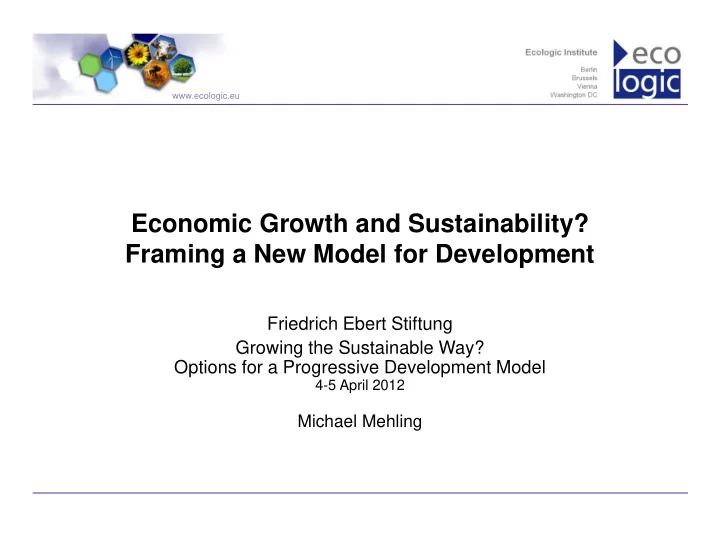

www.ecologic.eu Economic Growth and Sustainability? Framing a New Model for Development Friedrich Ebert Stiftung Growing the Sustainable Way? Options for a Progressive Development Model 4-5 April 2012 Michael Mehling
www.ecologic.eu Session Outline and Questions Drivers and Pressures Reforming Institutions Reforming Institutions Re-Thinking Paradigms Harnessing Transformation 2 5/2/2012 Michael Mehling: Economic Growth and Sustainability?
www.ecologic.eu A Glimpse at 2050 (I) Socioeconomic Trends Global population grows to 9 billion Global economy grows fourfold; poverty continues to fall 25% aged over 65 in OECD (from currently 15%) Growth absorbed by cities: 70% live in urban areas (Source: OECD, 2012; Brookings, 2011) 3 5/2/2012 Michael Mehling: Economic Growth and Sustainability?
www.ecologic.eu A Glimpse at 2050 (II) Energy and Climate Change Energy demand grows by 80% Fossil fuels still cover 85% of energy needs Greenhouse gas emissions rise 50% Atmospheric concentrations reach 685 ppm (Source: OECD, 2012) 4 5/2/2012 Michael Mehling: Economic Growth and Sustainability?
www.ecologic.eu A Glimpse at 2050 (III) Biological Diversity Terrestrial mean species abundance shrinks by 10% Freshwater biodiversity loss exceeds 30% Main pressures are climate change, commercial forestry and expanding croplands, followed by infrastructure expansion, human settlement and pollution (Source: OECD, 2012) 5 5/2/2012 Michael Mehling: Economic Growth and Sustainability?
www.ecologic.eu A Glimpse at 2050 (IV) Fresh Water Global water demand increases by 55% Over 40% of global population live in river basins with severe water stress 1.4 billion without access to sanitation (Source: OECD, 2012) 6 5/2/2012 Michael Mehling: Economic Growth and Sustainability?
www.ecologic.eu A Glimpse at 2050 (V) Health and the Environment Air pollution surpasses dirty water and lack of sanitation as top environmental cause of premature mortality top environmental cause of premature mortality Emission of SO 2 grow by 90%, NO x by 50% Premature deaths from exposure to particulate matter triple, from exposure to ground-level ozone double (Source: OECD, 2012) 7 5/2/2012 Michael Mehling: Economic Growth and Sustainability?
www.ecologic.eu Competition for Limited Resources Malthus Revisited? Increased demand creates new supply: alternative energy and unconventional fuel, rare earth metals, fresh water and unconventional fuel, rare earth metals, fresh water Resource extraction from inaccessible areas creates new pressures: Arctic, Antarctic, continental shelf, deep sea Where are the real limits? Arable land, peak phosphorus; ecosystems and biodiversity, atmospheric resilience 8 5/2/2012 Michael Mehling: Economic Growth and Sustainability?
www.ecologic.eu Economic Impacts of Unsustainability Climate change could destroy up to 14% of annual GDP if left unabated, compared to 0.2% of lost growth for adequate mitigation action (Stern, 2006 and others) mitigation action (Stern, 2006 and others) Annual loss of ecosystem service benefits from deforestation estimated at US$ 2 to 5 trillion (TEEB, 2012) Cost of biodiversity loss to the European Union alone estimated at € 450 billion, or 2-3% growth (Gerbrandy, 2012) 9 5/2/2012 Michael Mehling: Economic Growth and Sustainability?
www.ecologic.eu Reforming Institutions 300+ multilateral environmental agreements, thousands of regional and bilateral environmental treaties Proliferation of instruments and entities active in the area of Proliferation of instruments and entities active in the area of environmental protection (e.g. climate change) Trend to increased specialization, fragmentation, deformalisation, and regime overlap or competition Ongoing and endless discussion on strengthening UNEP 10 5/2/2012 Michael Mehling: Economic Growth and Sustainability?
www.ecologic.eu From Sustainable Development to the Green Economy Sustainable Development (and RTD): Apology or Utopia? Green Economy: “results in improved human well-being and social equity, while significantly reducing environmental risks and ecological scarcities” (UNEP, 2010) Beyond GDP? Towards a new cost accounting regime with direct valuation of natural capital and ecological services, and attribution of externalized costs 11 5/2/2012 Michael Mehling: Economic Growth and Sustainability?
www.ecologic.eu Policy Implications Greater turn to pricing and quantity rationing as flexible policy approaches; this includes subsidy reform Finance imperatives are daunting; for a sustainable energy transformation alone US$ 500 billion to 1 trillion annually More than 80% will have to come from the private sector through equity and debt 12 5/2/2012 Michael Mehling: Economic Growth and Sustainability?
www.ecologic.eu References Brookings (2012): Poverty in Numbers: The Changing State of Global Poverty from 2005 to 2015. Washington, DC: Brookings Institution OECD (2012): Environmental Outlook to 2050: The Consequences OECD (2012): Environmental Outlook to 2050: The Consequences of Inaction. Paris: OECD Stern, Nicholas (2006). The Economics of Climate Change . Cambridge, UK: Cambridge University Press UNEP (2010): Towards a Green Economy: Pathways to Sustainable Development and Poverty Eradication. Nairobi: UNEP 13 5/2/2012 Michael Mehling: Economic Growth and Sustainability?
www.ecologic.eu Thank You! Ecologic Institute, 1630 Connecticut Ave. NW, Suite 300 Washington, DC 20009 Washington, DC 20009 � +1-202-518-2060, � � + 1-202-387-4823 � � � � � michael.mehling@ecologic-institute.us www.ecologic-institute.us 14 5/2/2012 Michael Mehling: Economic Growth and Sustainability?
Recommend
More recommend